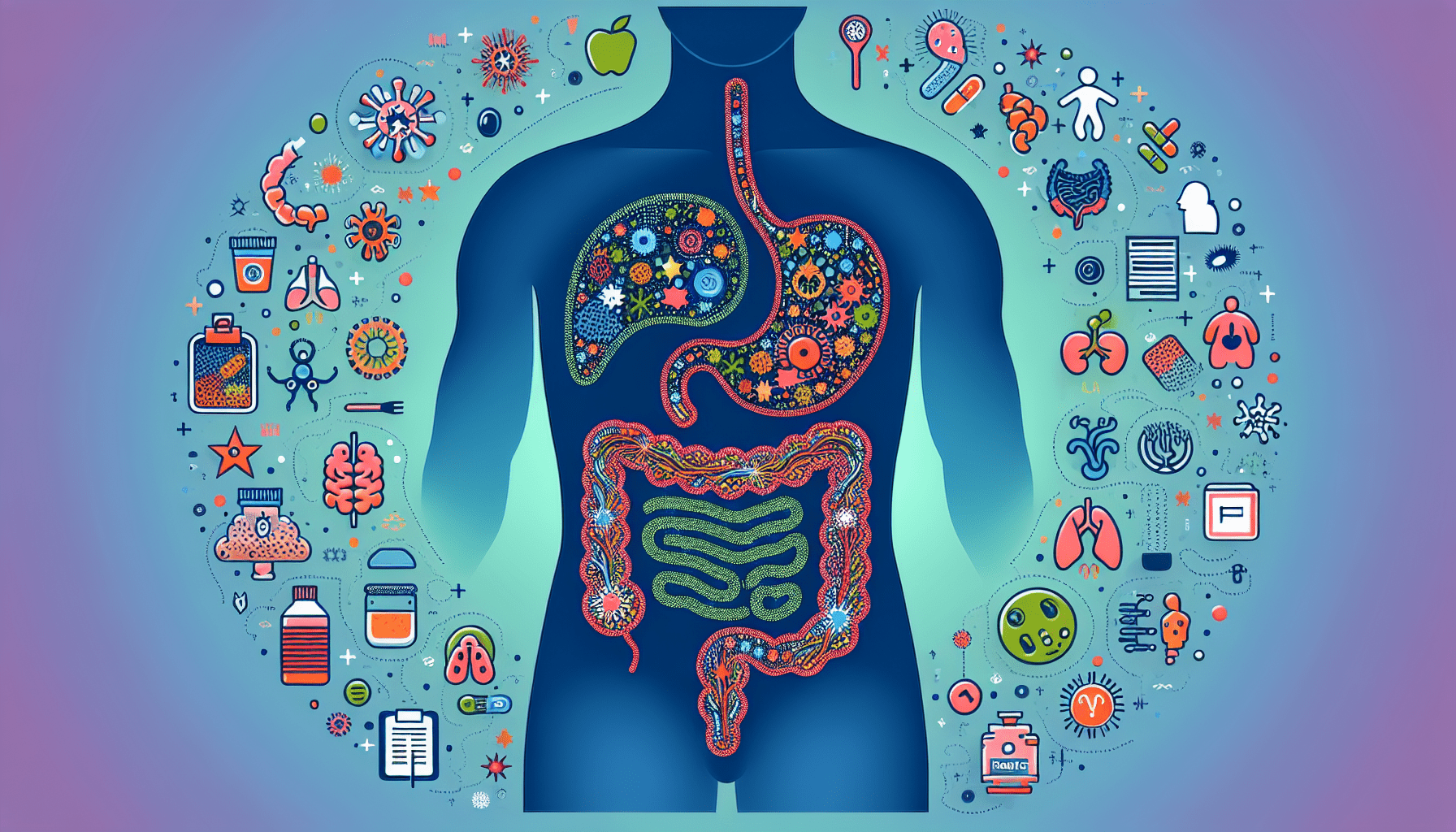Why Is Gut Health Important?
Maintaining good gut health is crucial for overall well-being. With a thriving community of microorganisms residing in your digestive tract, known as the gut microbiome, it plays a pivotal role in your immune system, digestion, mental health, and even weight management. It’s fascinating how this complex ecosystem influences various aspects of our health. So, let’s explore the reasons behind the importance of gut health and discover how we can nurture it for a happier and healthier life.

Introduction
Welcome to the comprehensive guide on gut health! In this article, we will explore the fascinating world of the gut and understand why it plays a crucial role in our overall well-being. From digestion and immune system support to mental health and maintaining a healthy weight, a healthy gut is the key to a happy and healthy life. So, let’s dive in and learn all about the importance of gut health!
What is Gut Health?
Overview
Gut health refers to the well-being and proper functioning of our gastrointestinal system, which includes the stomach, small intestine, and large intestine. It encompasses the balance of gut microbiota, or the collection of millions of microorganisms residing in our gut, as well as the optimal digestion and absorption of nutrients. Maintaining a healthy gut is essential for various bodily functions, ranging from digestion to immune system support.
The Gut Microbiota
At the core of gut health lies the gut microbiota, a complex community of trillions of microorganisms, including bacteria, viruses, fungi, and other beneficial microbes. These microbes live in symbiosis with our bodies and play a vital role in various physiological processes. They assist in breaking down food, producing essential vitamins, regulating the immune system, and protecting against harmful pathogens. Indeed, our gut microbiota is like a bustling city, with diverse inhabitants all working together for our well-being.
Functions of the Gut
Digestion and Nutrient Absorption
One of the primary functions of the gut is to break down food into smaller molecules for proper absorption of nutrients. The digestive process begins in the mouth and continues through the esophagus, stomach, and intestines. Enzymes produced by the gut help to break down proteins, carbohydrates, and fats, allowing our bodies to extract essential nutrients like vitamins, minerals, and amino acids. Without a healthy gut, this process is disrupted, leading to nutrient deficiencies and inadequate absorption.
Immune System Support
Believe it or not, a significant portion of our immune system resides in our gut. The gut microbiota plays a crucial role in supporting our immune defenses, as it helps to train and modulate immune cells. It acts as a barrier, preventing harmful pathogens from entering our bloodstream. Additionally, the gut microbiota promotes the production of antibodies and enhances the activity of immune cells, ultimately contributing to a stronger immune system.
Neurological Functions
The gut and the brain are in constant communication, forming what is known as the gut-brain axis. The gut has its own nervous system, known as the enteric nervous system, which communicates with the central nervous system. This connection allows for bidirectional communication, with signals traveling from the gut to the brain and vice versa. The gut microbiota produces neurotransmitters, such as serotonin and dopamine, which influence mood, behavior, and cognitive function. A healthy gut is essential for optimal neurological functions.
Hormone Regulation
Gut health also plays a significant role in hormone regulation throughout the body. The gut microbiota helps regulate the production and metabolism of hormones involved in appetite control, insulin sensitivity, and metabolism. Imbalances in the gut can lead to hormonal disruptions, leading to issues such as overeating, insulin resistance, and weight gain.
Detoxification
The gut is a vital player in the body’s detoxification processes. It helps eliminate waste products, toxins, and harmful substances from the body, ensuring they do not accumulate and cause harm. A healthy gut ensures efficient elimination and detoxification, contributing to overall well-being.
Factors Affecting Gut Health
Diet
One of the most significant factors impacting gut health is diet. Consuming a balanced diet rich in fiber, fruits, vegetables, and whole grains promotes a healthy gut environment. These foods provide essential nutrients and promote the growth of beneficial gut bacteria. On the other hand, a diet high in processed foods, sugar, and unhealthy fats can negatively impact the gut microbiota and lead to digestive issues.
Stress
Stress can take a toll on our gut health. When we are stressed, the body releases stress hormones that can disrupt the balance of gut bacteria, leading to gastrointestinal issues. Additionally, stress can affect digestive motility, contributing to symptoms like constipation or diarrhea. Managing stress through relaxation techniques, exercise, and self-care is essential for maintaining a healthy gut.
Antibiotics and Medications
While antibiotics and certain medications are vital for treating various conditions, their overuse can harm the gut microbiota. Antibiotics can kill both harmful and beneficial bacteria, leading to imbalances in the gut. Other medications, such as non-steroidal anti-inflammatory drugs (NSAIDs), can irritate the gut lining and contribute to gastrointestinal issues. It is crucial to use antibiotics and medications judiciously and under medical supervision.
Lack of Physical Activity
Physical inactivity can also negatively impact gut health. Exercise promotes healthy digestion by stimulating intestinal contractions, improving gut motility, and reducing the risk of constipation. Engaging in regular physical activity, such as walking, swimming, or cycling, can support a healthy gut.
Lack of Sleep
Sleep deprivation can disrupt the gut microbiota and lead to imbalances in gut bacteria. Studies have shown that inadequate sleep can alter the composition of the gut microbiota, potentially contributing to digestive issues and inflammation. Prioritizing quality sleep is essential for maintaining a healthy gut.
Environmental Factors
Environmental factors, such as pollution and exposure to toxins, can also affect gut health. Toxins present in our environment, including pesticides and heavy metals, can disrupt the gut microbiota and lead to gastrointestinal issues. Taking steps to minimize exposure to toxins, such as eating organic foods and filtering water, can help support a healthy gut.

Effects of Poor Gut Health
Digestive Disorders
Poor gut health can contribute to various digestive disorders, such as irritable bowel syndrome (IBS), inflammatory bowel disease (IBD), and gastroesophageal reflux disease (GERD). These conditions can cause symptoms like abdominal pain, bloating, diarrhea, or constipation, impacting quality of life.
Weakened Immune System
Imbalances in the gut microbiota can weaken the immune system, making individuals more susceptible to infections and illnesses. Without a robust immune system, our bodies are unable to fight off harmful pathogens effectively, leading to increased vulnerability to diseases.
Mental Health Issues
The gut-brain connection is evident when it comes to mental health. Poor gut health has been linked to mental health issues such as depression, anxiety, and even cognitive decline. The gut microbiota produces neurotransmitters that regulate mood and behavior, emphasizing the importance of a healthy gut for mental well-being.
Weight Gain and Obesity
Imbalances in the gut microbiota have been associated with weight gain and obesity. Certain bacteria in the gut may promote weight gain by increasing the extraction of calories from food or altering appetite-regulating hormones. A healthy gut is crucial for maintaining a healthy weight and preventing obesity-related complications.
Chronic Inflammation
Chronic inflammation, a condition characterized by persistent low-grade inflammation, is closely linked to poor gut health. An imbalanced gut microbiota can trigger inflammatory responses in the body, contributing to a host of chronic diseases, including heart disease, diabetes, and autoimmune disorders.
Ways to Improve Gut Health
Healthy Diet
Eating a healthy and balanced diet is one of the most effective ways to improve gut health. Include plenty of fiber-rich foods like fruits, vegetables, whole grains, and legumes. These foods promote the growth of beneficial gut bacteria and provide essential nutrients. Fermented foods like yogurt, sauerkraut, and kimchi are also excellent choices as they contain beneficial probiotics.
Probiotics and Prebiotics
Probiotics are beneficial bacteria that can be consumed through food or supplements. They help restore the balance of gut bacteria and improve digestive health. Prebiotics, on the other hand, are non-digestible fibers that serve as food for beneficial gut bacteria. Adding probiotic-rich foods or supplements and incorporating prebiotic foods like onions, garlic, bananas, and asparagus can support a healthy gut.
Reduce Stress
Managing stress is vital for maintaining gut health. Find relaxation techniques that work for you, such as meditation, deep breathing exercises, or practicing mindfulness. Engaging in hobbies, spending time with loved ones, and getting regular exercise can also help reduce stress levels.
Regular Exercise
Physical activity is not only beneficial for maintaining a healthy weight but also for promoting gut health. Aim for at least 30 minutes of moderate-intensity exercise most days of the week. Choose activities that you enjoy, such as biking, jogging, or dance classes, to make it a sustainable part of your lifestyle.
Adequate Sleep
Make sleep a priority and ensure that you are getting enough quality sleep each night. Aim for 7-8 hours of sleep and establish a consistent sleep routine. Create a comfortable sleep environment, free from distractions, and practice relaxation techniques before bed to improve sleep quality.
Hydration
Drinking an adequate amount of water is essential for good gut health. Water promotes digestion, assists in nutrient absorption, and helps maintain bowel regularity. Aim to drink at least 8 cups of water per day, and more if you are physically active or in hot weather.
Avoid Overuse of Antibiotics and Medications
Use antibiotics and medications judiciously, following the prescribed dosage and duration. Remember that antibiotics can disrupt the balance of gut bacteria, so only use them when necessary. Always consult with a healthcare professional before starting or stopping any medications.

Importance of Gut Health for Overall
Well-being
Enhanced Digestion and Nutrient Absorption
A healthy gut ensures optimal digestion and absorption of nutrients, allowing the body to obtain essential vitamins, minerals, and other vital substances. This leads to improved energy levels, better overall health, and enhanced well-being.
Stronger Immune System
Maintaining a healthy gut is crucial for a robust immune system. By supporting the growth of beneficial gut bacteria and modulating immune responses, a healthy gut helps protect against infections and diseases, keeping you healthier and less prone to illnesses.
Improved Mental Health
The gut-brain connection highlights the important role of gut health in mental well-being. A healthy gut supports the production of neurotransmitters that regulate mood and behavior, contributing to better mental health and a happier outlook on life.
Maintaining Healthy Weight
A healthy gut plays a significant role in weight management and preventing obesity. A balanced gut microbiota and proper digestion help regulate appetite, promote feelings of fullness, and optimize calorie extraction from food, ultimately assisting in weight maintenance.
Reduced Inflammation
A healthy gut helps keep inflammation in check, reducing the risk of chronic inflammation and associated conditions such as heart disease, diabetes, and autoimmune disorders. By promoting a balanced gut microbiota, you can support your body’s inflammatory response and safeguard your overall health.
Medical Conditions Linked to Gut Health
Inflammatory Bowel Disease (IBD)
Inflammatory bowel disease (IBD), which includes conditions like Crohn’s disease and ulcerative colitis, is closely linked to gut health. Imbalances in the gut microbiota, along with genetic and environmental factors, can contribute to the development and progression of these chronic inflammatory conditions.
Irritable Bowel Syndrome (IBS)
Irritable bowel syndrome (IBS) is a common digestive disorder characterized by symptoms such as abdominal pain, bloating, and altered bowel movements. While the exact cause of IBS is unknown, imbalances in the gut microbiota and increased gut sensitivity play a significant role.
Autoimmune Diseases
Autoimmune diseases, where the immune system mistakenly attacks healthy cells and tissues, have been associated with imbalances in the gut microbiota. Conditions like rheumatoid arthritis, lupus, and multiple sclerosis may be influenced by an unhealthy gut environment.
Obesity
Obesity has become a global health issue, and research has shown links between obesity and gut health. An imbalanced gut microbiota, often seen in obesity, can contribute to weight gain and metabolic disturbances, increasing the risk of obesity-related complications.
Type 2 Diabetes
Type 2 diabetes is a metabolic disorder characterized by insulin resistance and high blood sugar levels. Imbalances in the gut microbiota may contribute to the development and progression of type 2 diabetes by influencing insulin sensitivity and metabolic processes.

Research on Gut Health
Advancements in Microbiome Research
The study of the gut microbiota, known as microbiome research, has seen significant advancements in recent years. Cutting-edge technologies, such as DNA sequencing, have allowed scientists to better understand the composition and function of the gut microbiota, leading to groundbreaking discoveries and promising therapeutic avenues.
Influence of Gut Health on other Body Systems
Research has revealed that gut health is not just limited to the gastrointestinal system but extends its influence to other body systems. The gut microbiota, through its interaction with the immune system, nervous system, and endocrine system, can impact overall health and disease development.
Potential Therapies and Treatments
The understanding of gut health and its role in various medical conditions has opened up new possibilities for therapeutic interventions. Probiotics, prebiotics, fecal microbiota transplantation, and targeted medications are some of the emerging treatment options being explored to improve gut health and manage related disorders.
Conclusion
Maintaining a healthy gut is vital for overall well-being. From digestion and immune system support to mental health and weight management, the gut plays an essential role in numerous bodily functions. By adopting a healthy lifestyle, including a balanced diet, regular exercise, stress management, and getting enough sleep, you can support your gut health and enjoy the benefits of optimal well-being. Remember, a happy gut is a happy you!
Additional Resources

If you are fighting digestion issues on a daily basis (diarrhea, constipation or both) – you need to know this.
Scientists have discovered a strange tea recipe that can fix your digestion process for good no matter the cause of it… One doctor even found this tea COMPLETELY eliminates the root cause of your digestive issue.
And another study by doctors in the Philippines found more powerful and safer than any medication, diet or unpleasant enemas.
Imagine being finally able to poop without pain or being worried about the shameful accidents.
Anyone can make this poop-aid tea at home with a few quick ingredients.
Find out how right here:
Gross Tea Fixes Your Digestion Instantly?







